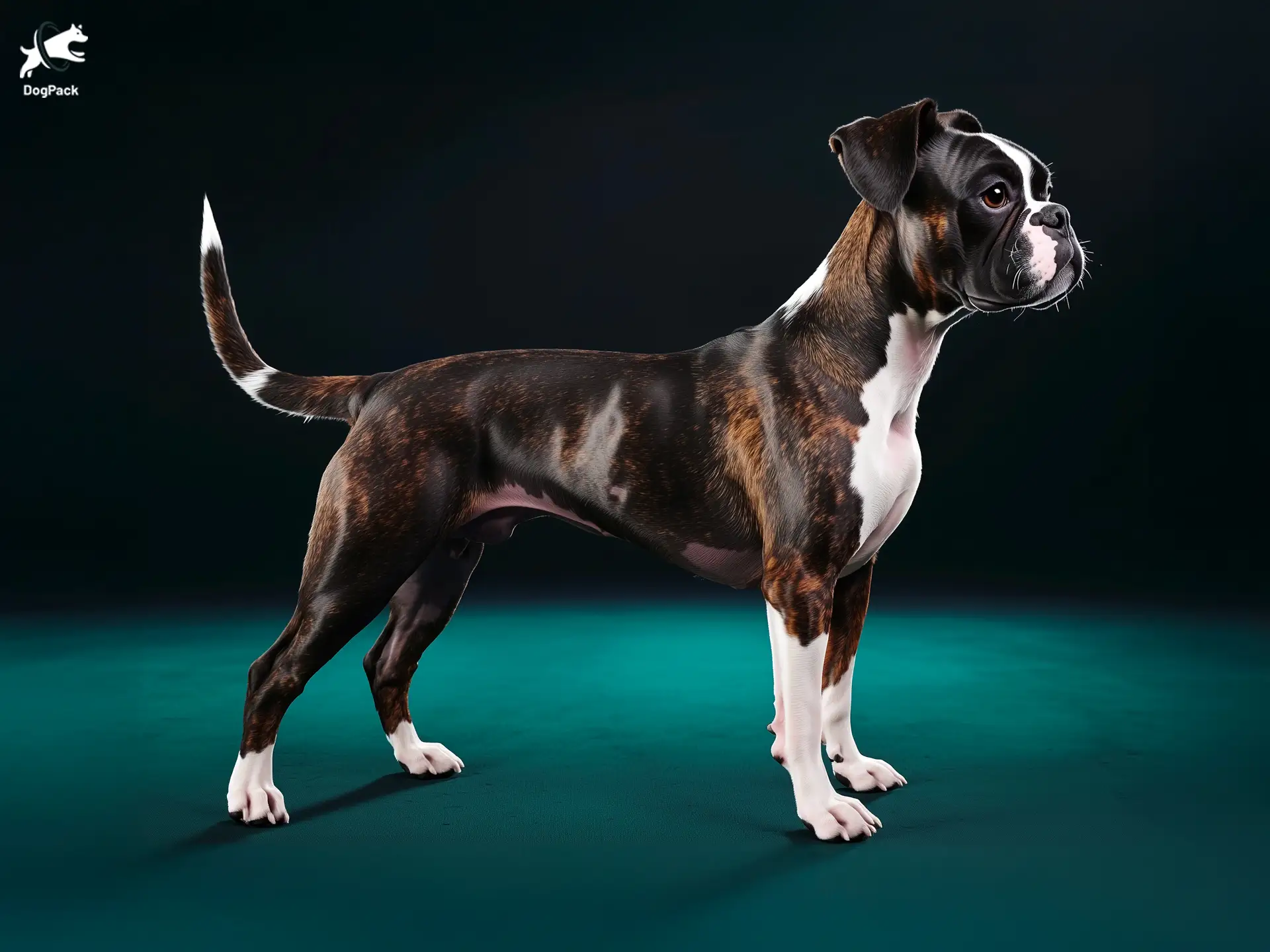Boston Boxer Dog Breed Info & Overview
Ever thought about combining the charm of the Boston Terrier with the exuberance of the Boxer? Enter the Boston Boxer! This medium-sized, energetic breed is known for its affectionate nature and playful spirit. Ideal for active families, the Boston Boxer brings together the best traits of both parent breeds, making it a delightful companion for those seeking a loyal and fun-loving pet.
Characteristics
Pictures
Breed History
The Boston Boxer is a relatively new hybrid, combining the friendly demeanor of the Boston Terrier with the spirited nature of the Boxer. This mix likely originated in the United States, aiming to create a companion that embodies the best qualities of both breeds. While not as famous as some designer dogs, the Boston Boxer is steadily gaining popularity among families.
Boston Terriers, known as the “American Gentleman,” bring their charm and adaptability to the mix. On the other hand, Boxers contribute their athleticism and protective instincts. Together, they form a breed that’s both affectionate and alert, making them excellent companions and watchdogs.
Although the Boston Boxer isn’t recognized by major kennel clubs, it’s appreciated by hybrid and designer dog enthusiasts. Organizations like the American Canine Hybrid Club acknowledge this delightful mix, highlighting its growing presence in the canine world.
Temperament, Personality
Boston Boxers are known for their lively and affectionate personalities. They love being around people and are especially good with children. Their playful nature means they’re always up for a game of fetch or a romp in the yard. Despite their energy, they’re also content to snuggle up on the couch after a day of fun.
These dogs are intelligent and eager to please, making them relatively easy to train. However, they can inherit a bit of stubbornness from their Boxer side. Patience and positive reinforcement go a long way in bringing out the best in them. Early socialization is key to ensuring they get along well with other pets and strangers.
Their protective instincts make them good watchdogs without being overly aggressive. The Boston Boxer strikes a balance between being alert and friendly, making them well-suited for families who want both a companion and a guardian.
Physical Characteristics
The Boston Boxer is a medium-sized dog with a sturdy build. They typically have a short, smooth coat that can come in a variety of colors, including brindle, black, and white. Their eyes are expressive and full of life, often reflecting their curious and playful nature.
Their ears can be either erect like the Boston Terrier’s or floppy like the Boxer’s, adding to their unique appearance. The muzzle is usually shorter than a Boxer’s but longer than a Boston Terrier’s, providing a balanced look that’s both endearing and functional.
Overall, the Boston Boxer embodies a blend of its parent breeds’ physical traits, resulting in a dog that’s both handsome and athletic. Their well-proportioned body makes them agile, capable of keeping up with an active lifestyle.
Health Issues
Like all breeds, the Boston Boxer can be prone to certain health issues. Common concerns include hip dysplasia, heart conditions, and respiratory problems due to their shorter muzzles. Regular veterinary check-ups are essential to catch any potential issues early on.
Allergies can also be a concern, manifesting as skin irritations or digestive problems. Feeding them a high-quality diet and monitoring their environment can help manage these issues. Additionally, they may inherit eye problems like cataracts, so regular eye examinations are recommended.
It’s important to obtain your Boston Boxer from a reputable breeder who screens for genetic conditions. Organizations like the Canine Health Information Center provide resources on health testing to ensure you’re getting a healthy pup.
Grooming Needs
One of the perks of owning a Boston Boxer is their low-maintenance coat. Weekly brushing is usually sufficient to keep their coat looking its best and to manage moderate shedding. During seasonal shedding periods, more frequent brushing might be necessary.
Bathing should be done as needed, typically every few months, unless they get into something messy. Their nails should be trimmed regularly to prevent overgrowth and discomfort. Don’t forget regular dental care; brushing their teeth several times a week can prevent dental diseases.
Their ears should be checked regularly for signs of infection or buildup. Cleaning their ears with a vet-recommended solution can help prevent ear issues. Overall, their grooming routine is manageable, making them suitable for owners who prefer lower-maintenance dogs.
Exercise Requirements
Boston Boxers are energetic and require daily exercise to stay happy and healthy. A combination of walks, playtime, and mental stimulation will keep them engaged. They enjoy activities like fetch, agility training, and even jogging with their owners.
Aim for at least 1–2 hours of exercise per day. Without sufficient activity, they might develop behavioral issues like chewing or excessive barking. Interactive toys and puzzle feeders can also help keep their minds sharp and prevent boredom.
Remember that they might be sensitive to extreme temperatures due to their short coat. During hot days, exercise should be scheduled for cooler parts of the day, and always provide plenty of water to keep them hydrated.
Training Tips
Training a Boston Boxer can be both enjoyable and rewarding, as this hybrid inherits intelligence from both parent breeds. With their eager-to-please nature, positive reinforcement works exceptionally well. Use treats, praise, and plenty of affection to encourage good behavior. Consistency is key, ensuring they understand what is expected of them in various situations.
While the Boston Terrier influence may make them quick learners, the Boxer side can introduce some stubbornness. Patience and persistence are essential when tackling more challenging commands. Early socialization is crucial to helping them become well-adjusted adults, comfortable in new environments and around unfamiliar faces.
Enrolling them in obedience classes can provide structure, offering an excellent way for them to interact with other dogs while learning key commands. These classes also help enhance their adaptability and strengthen the bond between you and your Boston Boxer through shared experiences.
Nutrition, Diet
Feeding your Boston Boxer requires careful attention to ensure they maintain their energy and overall health. Given their active lifestyle, a high-quality dog food rich in protein is essential to support their muscles and stamina. Typically, they thrive on 1.5 to 2.5 cups of dry food per day, split into two meals to avoid overeating and digestive issues.
Monitoring their weight is crucial, as the Boston Boxer can be prone to weight gain, which exacerbates health issues like hip dysplasia. To prevent obesity, avoid overfeeding and limit treats. Incorporating omega-3-rich foods can also promote a healthy coat and skin, keeping them in top condition.
Consult your veterinarian for tailored dietary recommendations, particularly if your Boston Boxer has specific needs based on age or activity level. They can suggest the best types of food and advise on necessary supplements to support their long-term health and vitality.
Adoption, Breeders
If you’re considering welcoming a Boston Boxer into your home, adoption or purchasing from a reputable breeder are both viable options. When choosing a breeder, ensure they provide health clearances for both parent breeds and allow you to meet the puppy’s parents. Websites such as the American Kennel Club can be great resources for finding trustworthy breeders.
Adoption is an excellent alternative, especially since many mixed breeds are available through shelters and rescue groups. Organizations like Petfinder can help you locate a Boston Boxer in need of a loving home. Adopting not only provides a dog with a second chance but can also be an incredibly rewarding experience for the family.
Always research your source carefully to avoid supporting unethical practices like puppy mills. Ask detailed questions about health history, and if possible, visit the facility to observe the care and conditions provided to the dogs.
Family Pet?
Boston Boxers make excellent family pets due to their affectionate and playful nature. They are great with children and can adapt well to various household dynamics. Their energy levels match well with active families who enjoy outdoor activities.
They typically get along with other pets if introduced properly and socialized early. Their friendly demeanor makes them less likely to be aggressive, although they may be protective of their family members.
Their size and adaptability also make them suitable for apartment living, provided they receive enough exercise. They thrive on companionship and do best in homes where they are included in daily activities.
Right For You?
If you’re an active individual or family looking for a loyal and energetic companion, the Boston Boxer could be the perfect fit. They require time for exercise and mental stimulation but offer endless affection in return.
First-time dog owners may find them manageable due to their trainability and friendly disposition. However, be prepared to invest time in training and socialization to bring out their best qualities.
Consider your lifestyle and ability to meet their needs before bringing a Boston Boxer into your home. Their adaptable nature makes them suitable for various living situations, but they thrive where they are loved and well-cared for.
Conclusion
The Boston Boxer combines the best of the Boston Terrier and Boxer breeds into one delightful package. Their affectionate, energetic, and intelligent nature makes them a joy to have around. Whether you’re a family with kids or an active single, this breed can adapt and become a loving member of your household.
With proper care, training, and socialization, the Boston Boxer can be a lifelong companion that brings joy and excitement to your life. If you’re ready for a dog that loves to play as much as it loves to cuddle, the Boston Boxer might just be your perfect match.
FAQs
-
Are Boston Boxers good with other pets?
Boston Boxers generally get along well with other pets if they are socialized early. Their friendly and playful nature allows them to enjoy the company of other dogs and even cats.
-
Do Boston Boxers have any special training needs?
While they are intelligent and eager to please, Boston Boxers may inherit some stubbornness. Consistent, positive reinforcement training methods work best for this breed.
-
How much exercise does a Boston Boxer require daily?
They need at least 1–2 hours of exercise each day. Activities can include walks, playtime, and mental stimulation to keep them happy and healthy.
-
Are Boston Boxers suitable for apartment living?
Yes, they can adapt to apartment living as long as they receive sufficient daily exercise. Their medium size and adaptable nature make them suitable for smaller spaces.
-
What is the lifespan of a Boston Boxer?
The Boston Boxer typically has a lifespan of 10–14 years, provided they receive proper care, nutrition, and regular veterinary check-ups.
Breed Ratings
Boston Boxers are smart and can learn commands quickly, especially with positive reinforcement.
This breed loves to play and enjoys interactive games with their family members.
They are energetic dogs that require daily exercise to stay content and well-behaved.
Moderate shedding can be managed with regular brushing.
They have a low to moderate prey drive but may chase smaller animals if not trained.
Their short coat requires minimal grooming, making them relatively low-maintenance.
With consistency and patience, they are quite trainable and eager to please.
They prefer company and may develop separation anxiety if left alone for long periods.
They may bark to alert but are not excessively noisy.
Drooling is minimal, especially compared to purebred Boxers.
Generally gets along well with other dogs, especially when socialized early.
Prone to certain health issues but generally healthy with proper care.














